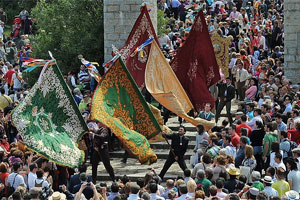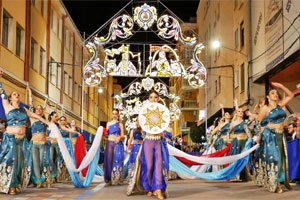Ronda Romántica
What is Ronda Romántica?
Ronda Romántica is a celebration that takes place every year in the city of Ronda, located in the province of Malaga, in the south of Spain. This festival aims to recall the romantic era of the 19th century, when the city experienced a great cultural and artistic effervescence.
During Ronda Romántica, the inhabitants of the city dress up in period costumes and various activities and events are organized for the enjoyment of visitors. These activities include parades of carriages and horses, period dances, typical costume contests, fireworks displays, and music and poetry recitals.
In addition, different markets are held where handmade products can be purchased, and exhibitions and theatrical performances are organized to showcase the city's history and culture.
It is a festival that brings together the inhabitants and visitors of the city to enjoy a unique experience in which the romantic era of the city is revived and its rich history and culture is celebrated.
Ronda Romántica has been celebrated since 2000. The idea for this festival arose as a way to recover and enhance the rich history and cultural heritage of the city of Ronda, and it has become a very popular celebration among both the inhabitants of the city and the tourists who visit it.
Every year, the festival attracts thousands of people who come to enjoy the numerous activities and events that are organized during the days that the celebration lasts.
What to see in Ronda
There are numerous places of interest to visit in Ronda, including:
- The Puente Nuevo: a spectacular stone bridge that crosses a deep canyon.
- The Plaza de Toros: one of the oldest and most beautiful bullrings in Spain.
- The Alameda del Tajo: a beautiful park that offers impressive views of the city and the valley.
- The Casa del Rey Moro: a Muslim fortress built in the 13th century.
- The Iglesia de Santa María la Mayor: an impressive Gothic church built in the 15th century.
- The Palacio de Mondragón: a Renaissance palace that houses an archaeological museum.
- The Jardín de Cuenca: a beautiful garden with panoramic views of the city.
- The Museo Lara: a museum with an impressive collection of historical artifacts and curiosities.
- The Muralla and the Arco de Felipe V: the remains of the city's ancient wall and a gateway to the city.
- The Historic Center: a labyrinth of narrow cobbled streets, squares and historic buildings that is worth exploring.
- Museum of the Bandolero: it has a wide collection of objects related to the history of bandits and banditry in the Andalusian area, including weapons, photographs, engravings, and other historical artifacts. Additionally, the museum offers guided tours that explain the stories and legends of the most famous bandits in the area, making it an interesting experience for lovers of history and Andalusian culture.
What to eat in Ronda
The typical cuisine of Ronda is a mixture of Andalusian and Mediterranean influences, with dishes made from fresh and high-quality products. Some of the most popular dishes in the area are:
- Oxtail stew: a stew made from oxtail, vegetables and red wine.
- Garlic soup: a traditional soup made with garlic, bread, pepper and cumin.
- Gazpacho: a cold soup made from tomato, cucumber, pepper, garlic and bread.
- Salmorejo: another cold soup similar to gazpacho but thicker, made from tomato, bread, garlic, olive oil and vinegar.
- Chivo al ajillo: a dish made from cooked kid meat with garlic, onion and white wine.
- Goat cheese: a local goat cheese with a mild and delicious flavor.
- Wine from the Serranía de Ronda: a wide variety of local wines made from grapes from the area, such as the tinta de Ronda variety.
- Typical desserts: among which the buñuelos de viento, rice pudding and pestiño stand out, a fried sweet with honey and anise flavor.





